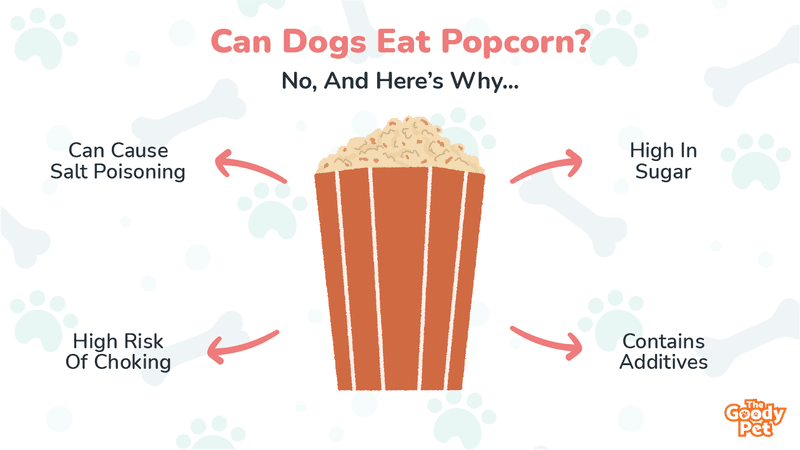Popcorn is a famous, indispensable night snack that completes the warming atmosphere of companionship during movie night. And sometimes, as you snuggle with your pet while watching an exciting movie, you might feel tempted to scoop some popcorn for your dear Fido, so it doesn’t feel left out of the fun.
But then again, if you always have a tinge of concern because the popcorn you eat is slathered with butter, and you’re wondering if it’s safe for your dog to eat it with you, then you’re on track.
So, can dogs eat caramel or salted popcorn? No, dogs cannot caramel popcorn or salted ones. This also applies to other flavored popcorn, sugary, buttered, or made with additives. These popcorns could potentially cause serious issues like salt poisoning or severe indigestion in dogs when consumed.
Your furry buddy’s digestive enzymes are not the same as yours, and what your liver and kidney can tolerate having evolved to eat certain foods over thousands of years, your four-legged pal’s can’t.
As you read on, you’ll find out everything related to dogs and popcorn: If popcorn is completely bad for dogs, what type of popcorn a dog can eat, why popcorn is harmful to dogs, what to avoid when feeding a dog popcorn, what to do if a dog eats flavored or salted popcorn, and more.
Is Popcorn Completely Bad for Dogs?

Popcorn isn’t entirely bad for dogs. On the contrary, popcorn contains several compounds that could help balance your dear fido’s nutritional requirements.
For example, popcorn is rich in dietary fiber, which is superb at speeding up catabolism and aiding digestion.
Furthermore, minerals such as magnesium, phosphorus, and zinc present in popcorn are essential for bone formation in dogs.
Now, despite the many minerals that abound in popcorn, dogs can’t have a large bowl of popcorn because their digestive systems haven’t evolved to process foods like that. Moreover, many healthy dog foods available today have an abundance of these minerals and vitamins, precluding the need to feed popcorn to a dog.
Why is Popcorn Harmful to Dogs?
Ordinarily, bits of popcorn fed to your pet aren’t harmful per se. It’s the topping and the quantity of popcorn involved that make it toxic.
Too much salted or sugar-coated popcorn is harmful to dogs for many reasons: salt poisoning, choking hazard, indigestion, obesity, cardiovascular diseases, etc. Here’s a look at some of the reasons why your dog shouldn’t have too much popcorn.
Salt Poisoning
Salt poisoning is a dangerous phenomenon that occurs in dogs after consuming substances high in salt concentration. And since salt is one of the primary ingredients used to flavor popcorn, there’s a high likelihood that your canine companion could suffer from life-threatening symptoms such as seizures, diarrhea, vomiting, or coma, from salt poisoning.
Choking Hazard
Choking happens when a dog’s nasal or tracheal passage gets obstructed either by a foreign object from without or because of an infection from within. For example, when a dog sniffs popcorn kernels, it could accidentally inhale some of it, preventing air from reaching its lungs, ultimately causing death.
Indigestion
Indigestion occurs when the enzymes in a dog’s stomach cannot break down the food consumed. This happens when digestive enzymes cannot act on the ingested substance because it contains certain compounds that hinder catabolism—the process of food breakdown in a dog’s stomach.
Indigestion, among other discomforting issues, could lead to a swollen abdomen, restricting the blood flow in the lower half of a dog’s body, a sure recipe for death.
Obesity
The butter in popcorn is loaded with fats and oil that would make your pooch obese in no time. This is even truer for dogs like Labrador Retrievers that possess genes that make them highly susceptible to obesity.
Consequently, your dear fido could find it extremely difficult to exercise, which could invite a series of other diseases. Furthermore, its extra-large body size could begin to weigh heavily on its joints, which may lead to hip dysplasia.
Cardiovascular Diseases
Obesity and cardiovascular diseases are like snow and Christmas. As soon as your dear-fido starts to put on more weight than is healthy, it soon develops heart diseases. For instance, excess cholesterol in a dog’s system can clog veins that carry blood vessels to the heart, leading to a stroke or a heart attack.
Gum Inflammation
When your canine pal chews half-popped or unpopped kernel, bits of it could lodge in the corners of its mouth. Consequently, bacteria start to breed on the trapped popcorn kernel remains and spread onto the gums, and may cause gum irritation and inflammation.
What To Avoid When Feeding A Dog Popcorn?

As mentioned before, popcorn isn’t bad per se because it contains nutrients that are beneficial to dogs. However, since most dog owners feed unhealthy popcorn to their four-legged companions, veterinary experts have advised against the act.
Nonetheless, if you think your pooch could benefit from some popcorn nutrients, here are some factors to consider when it comes to popcorn and dogs.
Avoid Processed Popcorn
The number one cardinal rule when feeding popcorn to dogs is to avoid anything that’s processed in a factory. Instead, you want to make sure that you buy only fresh and unprocessed popcorn.
So, if your pooch has grown to like popcorn as a favorite treat, it might help if you buy a sachet of fresh, well-grown popcorn. You would also need an air popper to pop the corn. That way, when you pop it yourself, you’re sure that there are no additives like sugar, salt, and preservatives.
Interestingly, air poppers aren’t that expensive, and you should be able to grab one for a small price. However, if that isn’t available, you could use the stovetop.
Also, keep in mind that microwaved popcorn could also be dangerous because of the release of dangerous chemicals from the bag during heating.
Ensure First-Time Supervision
If you’re feeding your canine companion popcorn for the first time, ensure you’re around to monitor its reaction. Try to feed your dog slowly, preferably feeding with your hand to control the speed at which your pooch hoovers up the popcorn.
Watch Out For Dogs With Corn Allergies
Dogs, like humans, can develop allergies to certain food types without explanation. Before feeding your dog popcorn, ensure that it’s not allergic to corn. You can do this by keeping an eye on your beloved canine pal for a while after giving it some popcorn. You should call the vet right away if you see signs of allergies like vomiting, irritability, non-stop scratching, etc.
Watch The Popcorn Size
Smaller dogs like the Yorkshire Terrier and the Chihuahua might have trouble eating popcorn. Hence, you’ll need to pound it or grind it into smaller pieces for them. That said, due to the spaces between a dog’s teeth, dogs find it difficult to chew too small objects.
Meaning that as you break the popcorn, you’d have to take care so that it’s not too tiny to wedge in between your doggie’s teeth.
Also, avoid feeding dogs popcorn kernels or half-popped kernels as it might irritate their gums or cause them to experience indigestion later on.
Moreover, picking out the hulls and unpopped corn using your hands shouldn’t be a difficult thing since you wouldn’t be feeding your four-legged friend a full bowl of popcorn.
Feed Popcorn As Treats Not Standard Meals
Dogs can’t easily digest popcorn. So, giving your pet a large bucket of popcorn to eat could be an official invitation to its final supper. In essence, be sparing with popcorn, even if it’s air-popped, plain, unsalted popcorn.
When giving treats, a rule of thumb is to make sure it doesn’t exceed 10% of your dog’s diet.
What To Do If My Dog Eats Flavored Or Salted Popcorn?
What happens when you leave a bowl of buttered popcorn to go pee only to return and discover that your pooch had descended on the unguarded offering? You mustn’t assume that all is well and carry on as nothing happened. You should take your canine friend to the veterinary right away and let the vet tell you what to do next.

Can My Dog Eat Cheese Flavored Popcorn?
Although cheese is a nutritious treat for dogs, cheese-flavored popcorn would upset your pooch’s digestive system.
And that’s because popcorn companies seldom use cheese as an ingredient in making cheese-flavored popcorn. Instead, they use additives and whatnots to give you the impression that it’s been flavored with cheese. And some of these additives have only been certified for human, not dog consumption.
Can My Dog Eat Chocolate-Coated Or Caramel Popcorn?
No, dogs can’t eat chocolate-coated or caramel popcorn as both are dangerous to a dog’s health. In addition, chocolate is known to contain caffeine and theobromine, which your furry buddy’s system cannot properly metabolize.
For caramel popcorn, the syrup used in coating the popcorn is loaded with so much sugar, you could as well spoon-feed raw sugar cubes to your pooch. And, considering that dogs are highly susceptible to obesity and diabetes than humans, it’s a harmful practice to feed your canine companion caramel or chocolate-flavored popcorn.
Also, keep in mind that theobromine is slowly absorbed in a dog’s system. Hence, your doggie might not exhibit adverse reactions after eating chocolate popcorn until a day later.





